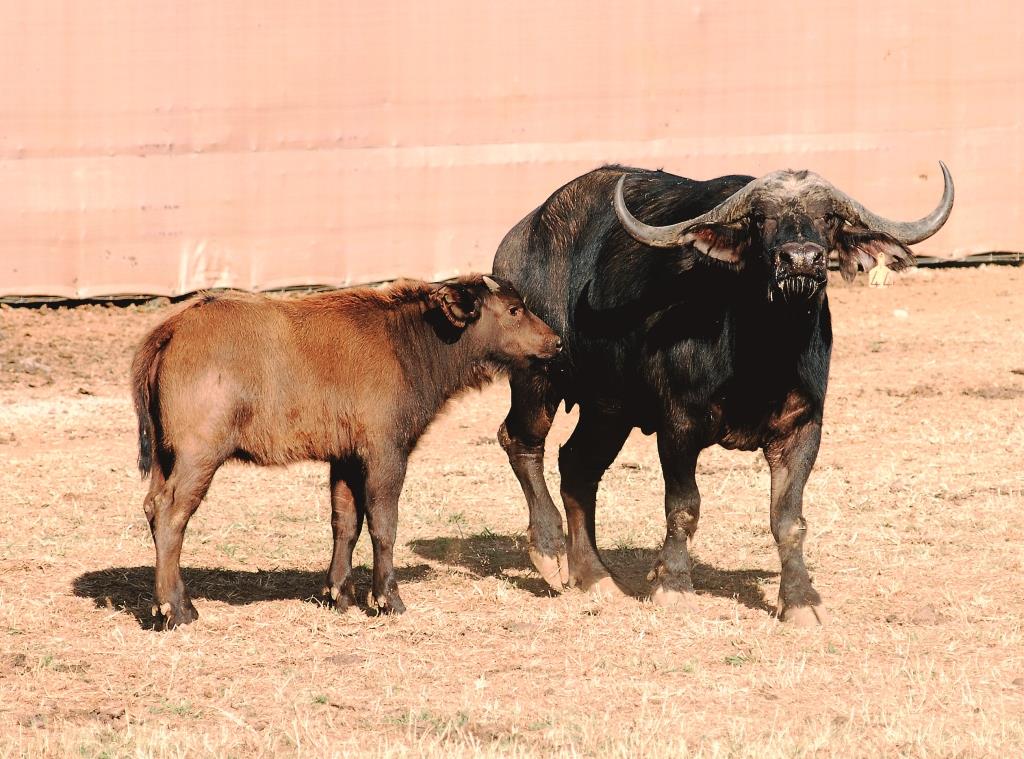Tanzania, the most expensive buffalo in Africa, is getting ready for a wedding night that is going to cost $31,000; the issue of this union will be worth even more.
People still cannot believe how much was paid for this cow—in a land where the average buffalo costs between $44,000 to $70,000. Jaco Troskie bought the huge and powerful cow for a staggering $2.5 million.
Troskie, the son of South African filmmaking mogul Boet Troskie, who made the film The Gods Must Be Crazy, outbid one of Africa’s richest men, Cyril Ramaphosa, for the East African buffalo. The buy broke records. In 2010, Piet du Toit and Cyril Ramaphosa bought a bull, Bayeto, for $1.2 million. In 2011, Peter Bellingham bought a bull, Senatla, for $2.2 million. Troskie, who made his money trading in game parks, beat the lot.
Tanzania is the biggest buffalo cow held in captivity in Africa, and possibly the world, and her horns span 43 inches long.
Troskie admits he did not think he would end up paying as much as he did. People said he was crazy and joked that he must have been drunk during the auction.
Loading...
“I don’t even drink a drop of alcohol,” he says.
“I didn’t want to lose her… There are only a handful of buffalos with 50 inch horns or wider. You do not find one around every corner.”
Troskie spent $8.1 million that day and walked away with 10 buffalos.
“My investment is long-term. My idea was to keep her, take very good care of her and nurse her. If I don’t make my money back in eight years, then there is something wrong… Returns on investments [are] about 36%. There’s no investment in this country that gives you that kind of return on a year-to-year basis. It’s a sound business to get involved in and will be for some time.”

Many in the business believe these sky-high prices cannot last. Piet du Toit disagrees.
Du Toit bought Tanzania for $324,000 last year from insurance billionaire Douw Steyn, and cleared $2.2 million from the recent auction. The 41-year-old began breeding game in 2001, and started focusing on rare game in 2006.
“There is [a lot of] money [to be made] in top genetics because there is nothing like it elsewhere. The breed is top class and investing in them will triple your money,” he says.
The former science and physical training teacher is now one of the country’s, if not the continent’s, top rare game breeders. The auction, held on his farm in the North West province of South Africa, where Tanzania, among other rare game, was sold, made almost $19 million on the day through the sale of 250 animals. The list of registered buyers reads like a board meeting. Among them, South African businessmen Ramaphosa and Steyn, and the Head of SAB Ltd in SA, Nicholas Adami, among others.
With an average return on investment of more than 70% over four years, du Toit is not planning on to quit anytime soon, but is also attempting to preserve the species.
“We are trying to get them as close to where they were in the early 1800s, when the settlers found [the buffalo] here [in Africa],” says du Toit.

????????????????????????????????????
According to the New World Encyclopedia, the population of
African buffalo was once tens of millions, but has dwindled to around 900,000. Most of them are in East Africa. They’ve been hunted and their habitat has been squeezed by farming, drought and disease.
Top-class animals like Tanzania are more expensive because of their size, strength, health and horn length. Another rare and prized buffalo bull in captivity is Bayeto, co-owned by du Toit and Ramaphosa. They bought Bayeto, who is currently staying on Ramaphosa’s farm, in 2010 for $1.2 million and sold his first calf this year for nearly $900,000. But Tanzania will be mated with her equal, Matetsi, an equally rare and thoroughbred East African bull worth $400,000. He will be united with Tanzania to produce an heir to their throne—expected to fetch even more money.
Is there even more money to be made in the game game? Forget about the tip of the iceberg, the people in the game business prefer their own analogy. The prices paid so far merely reach the ears of the hippo as it raises its head from the water.
Loading...
